人教新目标(Go for it)版七下Unit 4 Don't eat in class.复习课件(33张ppt)
文档属性
| 名称 | 人教新目标(Go for it)版七下Unit 4 Don't eat in class.复习课件(33张ppt) | 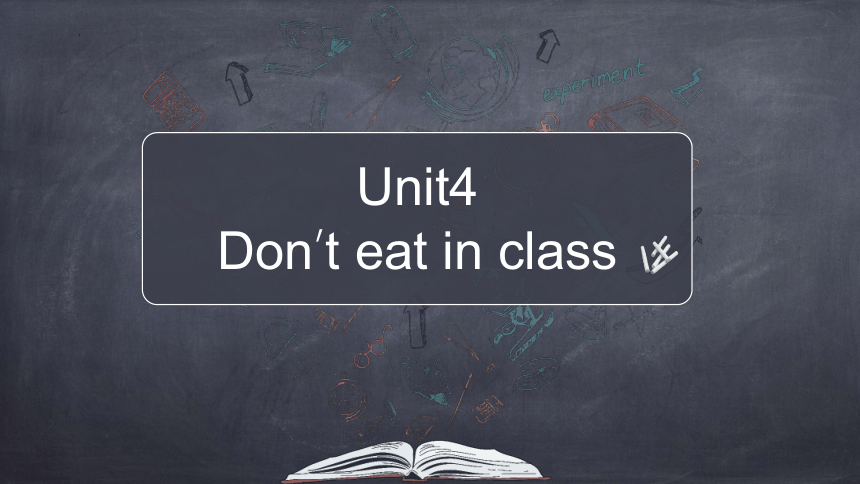 | |
| 格式 | ppt | ||
| 文件大小 | 27.3MB | ||
| 资源类型 | 教案 | ||
| 版本资源 | 人教新目标(Go for it)版 | ||
| 科目 | 英语 | ||
| 更新时间 | 2022-04-11 21:25:00 | ||
图片预览

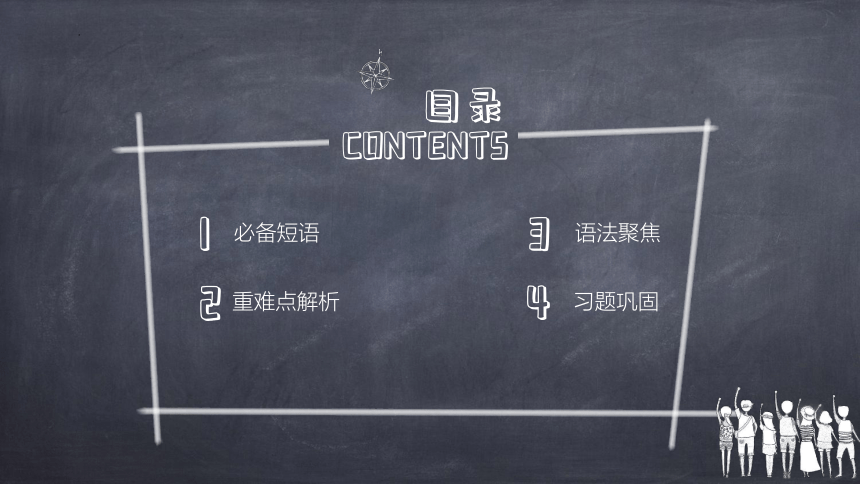
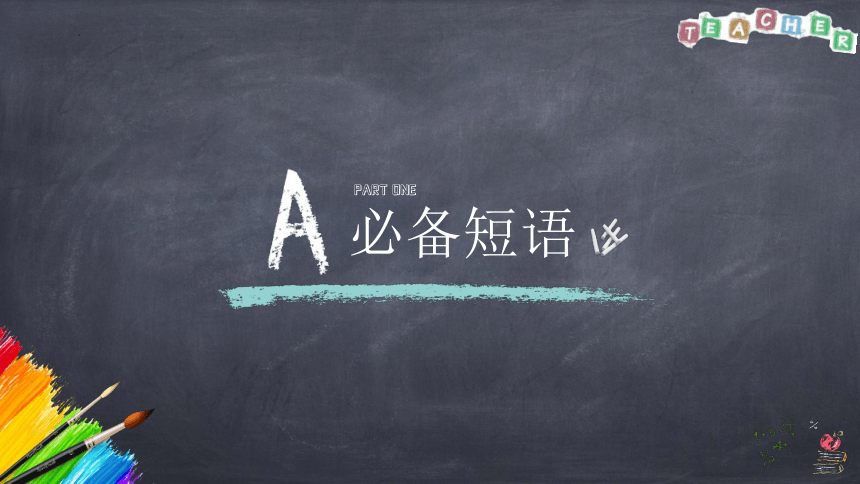
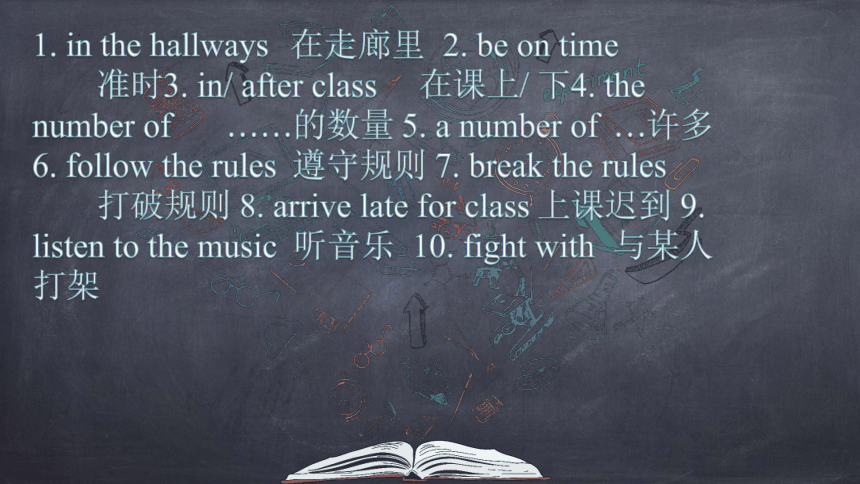
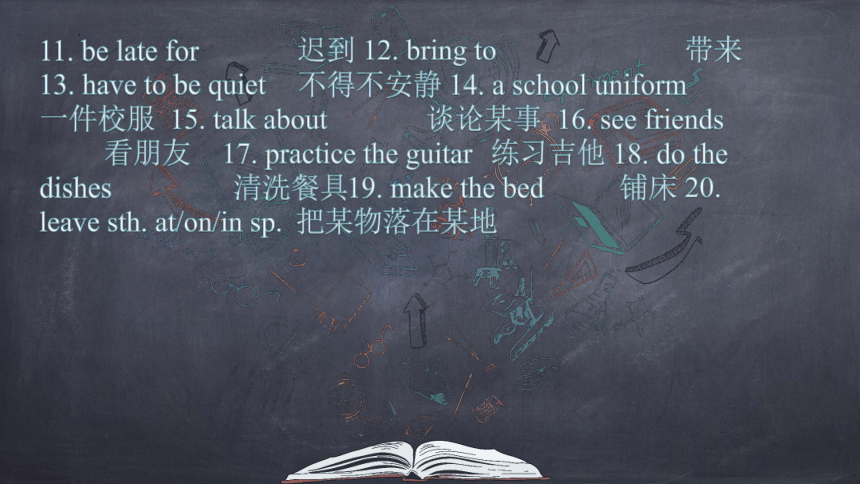
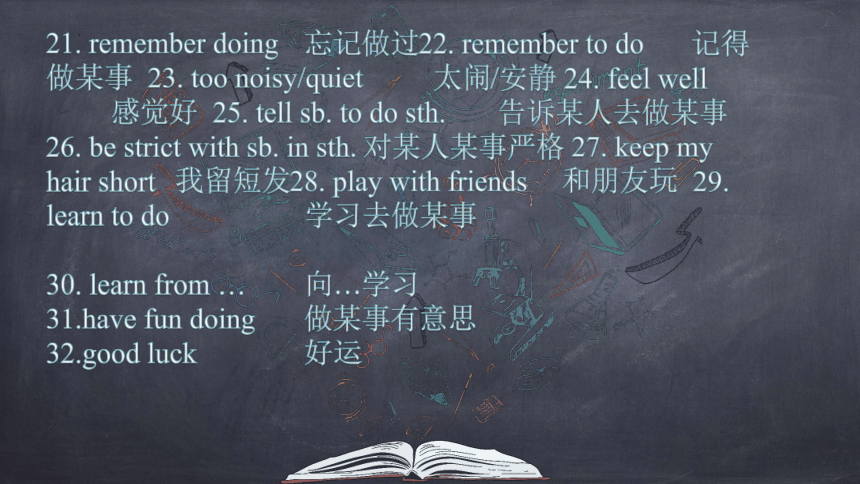
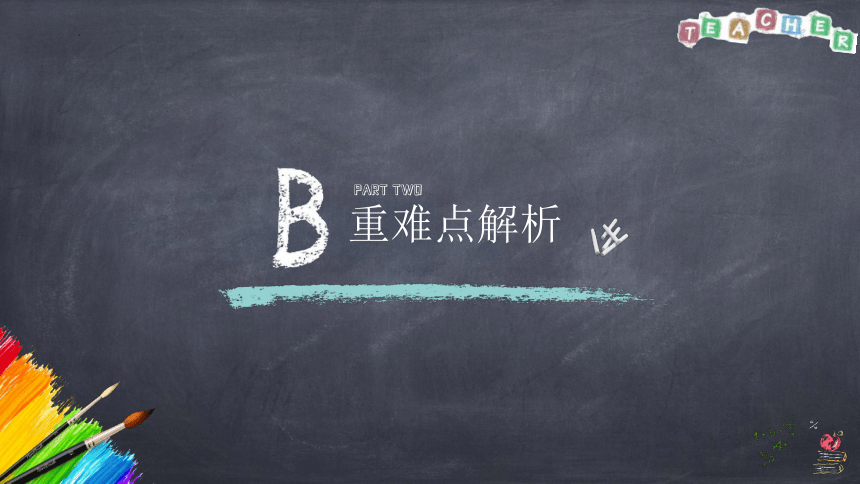
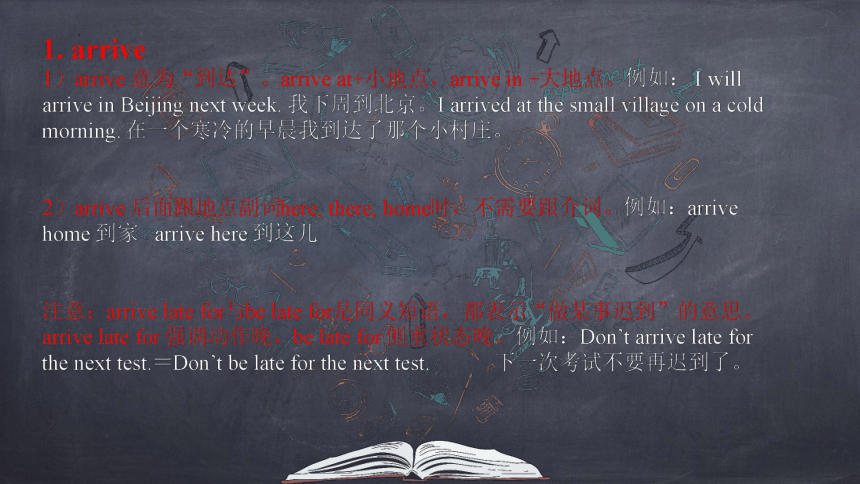
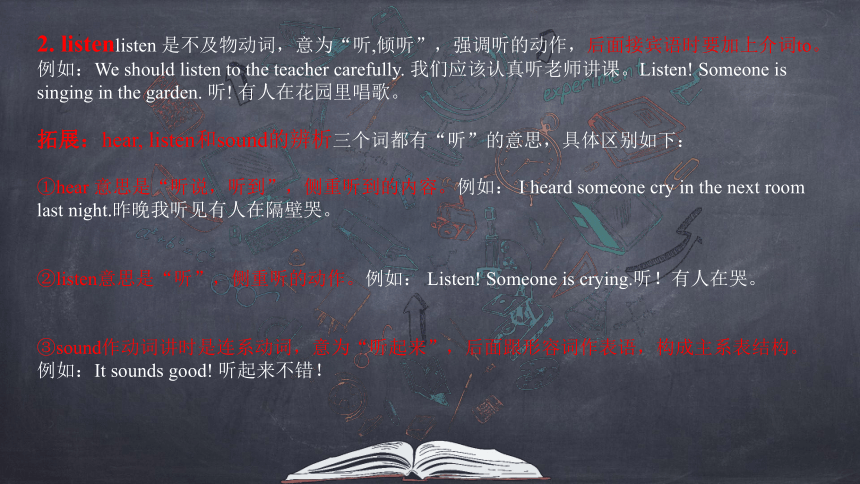
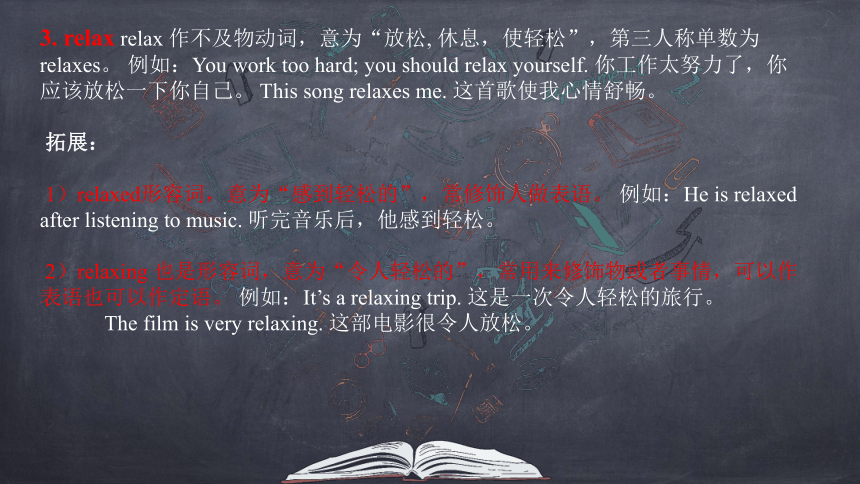
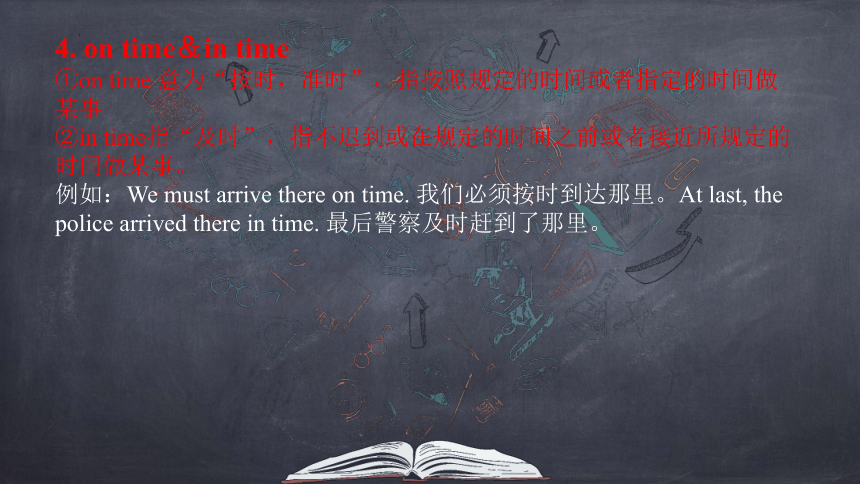
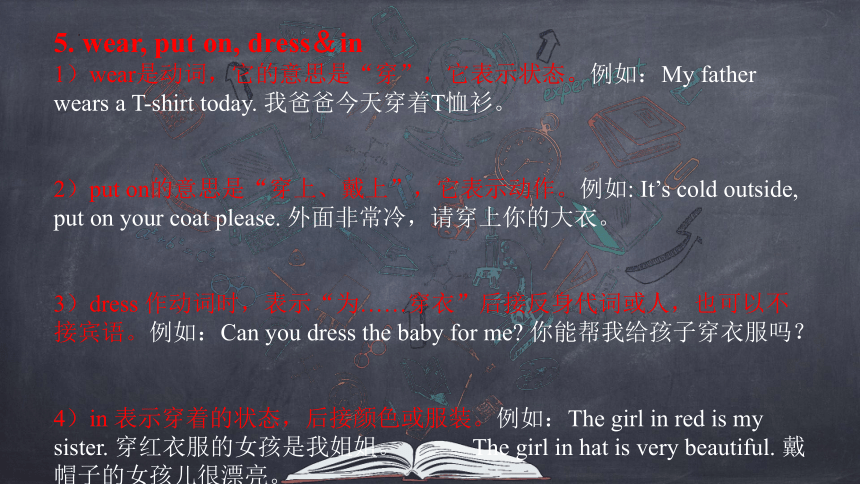
文档简介
(共33张PPT)
Unit4
Don’t eat in class
CONTENTS
目录
必备短语
1
重难点解析
2
语法聚焦
3
习题巩固
4
必备短语
PART ONE
重难点解析
PART TWO
1. arrive
1)arrive 意为“到达”。arrive at+小地点,arrive in +大地点。例如: I will arrive in Beijing next week. 我下周到北京。I arrived at the small village on a cold morning. 在一个寒冷的早晨我到达了那个小村庄。
2)arrive 后面跟地点副词here, there, home时,不需要跟介词。例如:arrive home 到家 arrive here 到这儿
注意:arrive late for与be late for是同义短语,都表示“做某事迟到”的意思。arrive late for 强调动作晚,be late for 侧重状态晚。例如:Don’t arrive late for the next test.=Don’t be late for the next test. 下一次考试不要再迟到了。
2. listenlisten 是不及物动词,意为“听,倾听”,强调听的动作,后面接宾语时要加上介词to。例如:We should listen to the teacher carefully. 我们应该认真听老师讲课。Listen! Someone is singing in the garden. 听! 有人在花园里唱歌。
拓展:hear, listen和sound的辨析三个词都有“听”的意思,具体区别如下:
①hear 意思是“听说,听到”,侧重听到的内容。例如: I heard someone cry in the next room last night.昨晚我听见有人在隔壁哭。
②listen意思是“听”,侧重听的动作。例如: Listen! Someone is crying.听!有人在哭。
③sound作动词讲时是连系动词,意为“听起来”,后面跟形容词作表语,构成主系表结构。例如:It sounds good! 听起来不错!
3. relax relax 作不及物动词,意为“放松, 休息,使轻松”,第三人称单数为relaxes。 例如:You work too hard; you should relax yourself. 你工作太努力了,你应该放松一下你自己。 This song relaxes me. 这首歌使我心情舒畅。
拓展:
1)relaxed形容词,意为“感到轻松的”,常修饰人做表语。 例如:He is relaxed after listening to music. 听完音乐后,他感到轻松。
2)relaxing 也是形容词,意为“令人轻松的”,常用来修饰物或者事情,可以作表语也可以作定语。 例如:It’s a relaxing trip. 这是一次令人轻松的旅行。 The film is very relaxing. 这部电影很令人放松。
4. on time&in time
①on time 意为“按时,准时”,指按照规定的时间或者指定的时间做某事
②in time指“及时”,指不迟到或在规定的时间之前或者接近所规定的时间做某事。
例如:We must arrive there on time. 我们必须按时到达那里。At last, the police arrived there in time. 最后警察及时赶到了那里。
5. wear, put on, dress&in
1)wear是动词,它的意思是“穿”,它表示状态。例如:My father wears a T-shirt today. 我爸爸今天穿着T恤衫。
2)put on的意思是“穿上、戴上”,它表示动作。例如: It’s cold outside, put on your coat please. 外面非常冷,请穿上你的大衣。
3)dress 作动词时,表示“为……穿衣”后接反身代词或人,也可以不接宾语。例如:Can you dress the baby for me 你能帮我给孩子穿衣服吗?
4)in 表示穿着的状态,后接颜色或服装。例如:The girl in red is my sister. 穿红衣服的女孩是我姐姐。 The girl in hat is very beautiful. 戴帽子的女孩儿很漂亮。
6. strict
strict 形容词,意为“严厉的,严格的”,在句子中可以做表语、定语。
常用短语:
①be strict with sb. 意为“对某人要求严格”
②be strict in sth. 意为“对某事要求严格”
例如:She is a strict teacher. 她是一个严格的老师。She is strict with her students and strict in her work. 她对她的学生和工作要求严格。
7. bring
bring 动词,意为“带来;拿来”。例如:Bring your English book to my office. 把你的英语书带到我办公室里来。
辨析:bring&take
1) bring指从别处将某人或者某物带到说话人所在的地方。例如:Please bring your family photo tomorrow. 明天请把你的全家福带过来。
2) take 意为“带走,拿走”时,指把某人或者某物从说话人所在地带走。例如:His father often takes him to the zoo on weekends. 他爸爸周末经常带他去动物园。
8. outside1)outside 副词,意为“在外面”,反义词是inside。例如:Don’t go outside. It’s too cold. 不要到外面去,天气太冷了。
2)outside还可以做介词, 意为“在……外面”。例如:There is a new car outside the house. 房子外边有一辆新车。
3) outside 作名词,意为“外部,外表”。例如:The outside of the house is red. 这个房子的外部是红色的。
辨析:作副词时out 与outside的区别
out 副词 意为“外出,出来”,其反义词为in。
outside 副词 作副词时,意为“在外面,在户外”等,其反义词为inside。
拓展:go out的用法1) 外出,或者指“参加社交活动,外出交际或娱乐”。例如:Mary goes out a lot on Sundays. 每逢周日,玛丽的应酬非常多。
2) 出去。例如:Let’s go out for a walk. 让我们出去散步吧。
3) 出国,移居国外。例如:He went out to Canada two years ago. 他两年前移居加拿大了。
4) 过时,不流行。例如:This kind of shoes went out last year. 这款鞋去年就过时了。
9. dish
1) dish 名词,意为“碟,盘”,做餐具讲时,常用复数形式,其前常加the。do the dishes 相当于wash the dishes,意为“清洗餐具”。
例如:It’s your turn to do the dishes today. 今天轮到你洗碗了。
2)dish 还可用作可数名词,意为“菜肴,一道菜”。
例如:He likes cold dishes. 他喜欢凉菜。
辨析:dish&plate
dish和plate都是“盘,碟”的意思,它们的区别在于:
①dish 可以泛指就餐时所用的餐具,包括盘、碗、碟、杯、刀、叉等,特指较深的盘子。
例如:Please dry the dishes and put them away. 请你把餐具擦干, 收拾好。
②plate 指较平的盘子、碟子, 可用来盛汤,也可用来装菜。
例如:
Our host was very generous, heaping a plate of food to us.主人十分慷慨, 给我们装了一盘食物。
10. practice
1)practice 作动词时是及物动词,意为“练习,训练”,其后可跟名词、代词或动名词做宾语。 例如: I often practice my English in the morning. 我经常在早上练习英语。 He practices playing the piano every day. 他每天练习弹钢琴。
2)practice 作名词,意为“练习,实践”,是不可数名词。 例如: Playing the piano needs a lot of practice. 弹钢琴需要多加练习。 Practice makes perfect. 熟能生巧。
11. follow
follow 动词,意为“遵循,跟随”。follow the rules 意为“遵守规则”。 例如: You must follow the school rules. 你必须遵守学校规章制度。
拓展:follow常见的其他用法有:1) 跟随,跟着。例如:Please follow me. I’ll show you the way.请跟我走,我来给你带路。
2) 明白,领悟。例如:You are speaking too fast and we can’t quite follow you. 你讲的太快,我们不太懂你的意思。
3) 表示“沿……而行”。例如:follow the road 沿路而行
12. feel
1)feel作行为动词,意为“觉得,认为”。 例如: How do you feel today 今天你感觉怎样 I feel that you will win. 我感觉你会赢。
2)feel 作连系动词,意为“感觉,摸起来”,其后跟形容词作表语。 例如: I feel happy today. 我今天感觉很高兴。 Your hand feels cold. 你的手摸起来很凉。
1. Don’t’ arrive late for class. ★
辨析: get to/reach/arrive相同点:都是“到达”的意思不同点:get to+地点;reach+地点 arrive at+小地点(车站等);arrive in+大地点(国家等)注意:
①get to与地点副词(here/there/home…)不用介词to②arrive是不及物动词,后面若接地点名词则要和in/at连用,接地点副词时则不用介词。③reach是及物动词,后面直接接地点名词或副词。
练习: 1.I will send you an e-mail as soon as I ____ in Canada.
A. arrive B. arrived C. am arriving D. are arriving 2. How does Tina _____ to school A. arrive B. get C. reach D. be
4. Can we bring music players to school ★
辨析take,bring: ①.take 指把东西从说话地带到别的地方。
如:Please take the books to the classroom. 请把书带到教室去。
②.bring “带来”指把东西从别处带到说话地。
如:Can we bring music players to school 我们能把音乐播放器带到学校里来吗?Remember to bring your homework to school tomorrow. 记得明天把你的作业带到学校来。
练习:My English book is in your room. Can you _____ it to me A. find B. take C. bring D. help
6. But remember, they make rules to help us. ★★remember “记得,记住”,是及物动词,可以直接加名词。 用法:
remember doing sth 记得已做某事(已做)remember to do sth 记得要做某事(还没做)
【拓展】forget意为“忘记,忘了”,作remember反义词时,用法和remember相同。
练习:
1. There are many rules in your school. Can you _____ them
A. remember B. think C. help D. bring2. We have no apples, please ______ to buy some apples after school, Tom.A. think B. remember C. find D. relax
7. Parents and schools make rules to help students. ★★
help 作动词意为“帮助”,常用的结构有: ①.help sb (to) do sth 帮助某人做某事如:help his mom make breakfast 帮他的妈妈做早餐
②.help sb with sth(n.) 帮助某人做某事如:Lily often helps her mom with some housework after school. 莉莉放学后常帮她的妈妈做些家务。
③.help oneself(myself/yourself/herself…) to+ n. 请随便用…如:Help yourself to some fruits. 随便吃点水果吧。
④.help还可作名词,表示“帮助”,是不可数。如:Can you give me some help 能帮我个忙吗?
练习:Mary can _____ his mother ____ the housework on weekends. A. helps; does B. helps; do C. help; do D. help; does
8. There are too many rules! ★★too many, too much与much too的区分:
易混词组 意义及用法 例句
too many 形容词,“太,太多”,接可数名词 There are too many people in the park.
too much 形容词,“太多”,接不可数名词 I have too much homework today.
much too 副词,“太,非常”,接形容词或副词 My mother is much too busy.
练习:1. David ate _____ dumplings for dinner, so he feels _____ terrible now. A. too much; much too B. too many; much too C. too many; too many D. much too; too much 2. I often go to bed late because I have _____ homework to do every day. A. too many B. too much C. many too D. much too
语法聚焦
PART three
1.情态动词have to 的用法:
意思是“必须、不得不”,它强调客观需要。 ?①.结构:主语+have/has to+动词原形+其他 ??
如:We have to wear sneakers for gym class. 在体育课上我们必须穿运动鞋。 He has to stay here. 他必须待在这。 I had to get up at 5:00 am last Monday. 上周一我不得不早上5点起床。?
②.否定形式:主语+don't/doesn’t have to+动词原形+其他?练习:
1.–Can you go to see a movie with us this evening -Sorry, I can’t. I ____ take care of my little brother at home because my mother is ill. A. can B. must C. would D. have to2. –I can’t stop smoking, doctor. -For your health, I’m afraid you ______. A. may B. need C. have to D. must
2.情态动词must的用法:
must表示说话人的主观看法,及主观上的必要性,还用于命令或愿望。只用于现在时,无人称和单数的变化。在表示过去、将来和完成时,用have to的相应形式来代替must。① .在表示有做某一个动作的必要和义务,它的意思是“必须,应该”。
如:You must finish your homework first. 你必须先完成作业。
② .表示有很大把握的判断或者推测,意思是“一定,准是”。
如:The tall man must be your father. 那个高个子男人一定是你的爸爸。
③ .以must开头的一般疑问句,它的否定回答用needn’t(不必要),不用mustn’t(不允许),mustn’t常用于否定句中表示“不允许,禁止”。
如:-Must I go there on foot 我必须得走过去吗? -No, you needn’t. 不,你不需要。
练习:
1.You _____ cross the road when the traffic lights are red.
A. mustn’t B. can’t C. wouldn’t D. needn’t2.-Must I go to medical school and be a doctor like you, Dad -No, you ____, son. You’re free to make your own decision.A. can’t B. mustn’t C. shouldn’t D. needn’t
3. -May I go out now, Dad -No. You ____ let your mother know first.A. can B. may C. need D. must
3. 祈使句 ①.定义:用于表达命令、请求、劝告、警告、禁止等的句子叫做祈使句,祈使句最常用于表达命令
②.祈使句因对象(即主语)是第二人称,所以通常都省略。祈使句的动词都为一般现在时,句末则使用句号或感叹号来表示结束。③.祈使句的肯定句:行为动词原形+其他如:Go and wash your hands. 去洗你的手。——命令 Be quiet, please. = Please be quiet. 请安静。——请求 Look out!Danger! 小心!危险!——强烈警告,已如感叹句 Keep off the grass. 勿践草坪。——禁止
④.以Let开头的祈使句,Let后宾语是是第一人称时,否定形式是在宾语后加not。如:Let’s not do that again. 我们别再那样做了。
如果Let 后面宾语是第三人称,否定形式是在Let前加助动词Don’t。如:Don’t let them come in. 别让他们进来。
⑤.祈使句的否定通常使用Don't …,Don't+动词原形(行为动词/be动词)+其他如:Don't let the dog in. 不要让那只狗进来。 Don't touch, please. 请不要用手触摸。 Don't be silly. 别傻了。
练习:
1.-Jim, _____ read books while you are walking in the street. It’s very
dangerous
- OK, thank you.
A. don’t B. doesn’t C. won’t D. can’t
2. ____ me the truth, or I won’t let you leave here.
A. Tell B. To tell C. Telling
3. - I’m leaving now.
- ______ you turn off the lights.
A. To make sure B. Make sure C. Made sure D. Making sure
习题巩固
PART four
1. How _____ orange _____ there in the bottle A. many; is B. many; are C. much; are D. much; is
2. Don’t listen _____ the music in the classroom _____ in the hallways. A. /; and B. /; or C. to; / D. to; or
3. -Can you cook fish - ________ . It’s easy. A. No, I can’t B. Yes, I can C. Sorry, I can’t D. Yes, I need
4. — How are you going to the train station to meet your uncle —I am going there _____ my car. A. at B. on C. by D. in
5. ______ your homework now. You must see the doctor first. A. Do B. Don’t do C. Don’t D. Can’t
6. I can’t go out ____ school nights. A. at B. in C. on D. by
7. It’s raining all day, so my brother ______ stay at home. A. must B. have to C. must to D. has to
8. We have ______ rules in our school. A. too many B. too much C. many too D. much too
9. -Must I finish my homework right now -No, you _______. A. needn’t B. may not C. mustn’t D. can’t
10. Can you go _____ on school nights A. up B. out of C. out D. in
11. We have to _______ uniforms at school. A. wear B. put on C. in D. have
12. Our teacher is strict ______ us ______ everything. A. in, with B. in, in C. with, with D. with, in
13. Please keep the door ______. A. opening B. open C. opened D. to open
14. Remember ______ the book next time. A. bring B. to take C. to bring D. to carry
15. Don’t _______ your book in your bedroom. A. keep B. bring C. leave D. leave for
Unit4
Don’t eat in class
CONTENTS
目录
必备短语
1
重难点解析
2
语法聚焦
3
习题巩固
4
必备短语
PART ONE
重难点解析
PART TWO
1. arrive
1)arrive 意为“到达”。arrive at+小地点,arrive in +大地点。例如: I will arrive in Beijing next week. 我下周到北京。I arrived at the small village on a cold morning. 在一个寒冷的早晨我到达了那个小村庄。
2)arrive 后面跟地点副词here, there, home时,不需要跟介词。例如:arrive home 到家 arrive here 到这儿
注意:arrive late for与be late for是同义短语,都表示“做某事迟到”的意思。arrive late for 强调动作晚,be late for 侧重状态晚。例如:Don’t arrive late for the next test.=Don’t be late for the next test. 下一次考试不要再迟到了。
2. listenlisten 是不及物动词,意为“听,倾听”,强调听的动作,后面接宾语时要加上介词to。例如:We should listen to the teacher carefully. 我们应该认真听老师讲课。Listen! Someone is singing in the garden. 听! 有人在花园里唱歌。
拓展:hear, listen和sound的辨析三个词都有“听”的意思,具体区别如下:
①hear 意思是“听说,听到”,侧重听到的内容。例如: I heard someone cry in the next room last night.昨晚我听见有人在隔壁哭。
②listen意思是“听”,侧重听的动作。例如: Listen! Someone is crying.听!有人在哭。
③sound作动词讲时是连系动词,意为“听起来”,后面跟形容词作表语,构成主系表结构。例如:It sounds good! 听起来不错!
3. relax relax 作不及物动词,意为“放松, 休息,使轻松”,第三人称单数为relaxes。 例如:You work too hard; you should relax yourself. 你工作太努力了,你应该放松一下你自己。 This song relaxes me. 这首歌使我心情舒畅。
拓展:
1)relaxed形容词,意为“感到轻松的”,常修饰人做表语。 例如:He is relaxed after listening to music. 听完音乐后,他感到轻松。
2)relaxing 也是形容词,意为“令人轻松的”,常用来修饰物或者事情,可以作表语也可以作定语。 例如:It’s a relaxing trip. 这是一次令人轻松的旅行。 The film is very relaxing. 这部电影很令人放松。
4. on time&in time
①on time 意为“按时,准时”,指按照规定的时间或者指定的时间做某事
②in time指“及时”,指不迟到或在规定的时间之前或者接近所规定的时间做某事。
例如:We must arrive there on time. 我们必须按时到达那里。At last, the police arrived there in time. 最后警察及时赶到了那里。
5. wear, put on, dress&in
1)wear是动词,它的意思是“穿”,它表示状态。例如:My father wears a T-shirt today. 我爸爸今天穿着T恤衫。
2)put on的意思是“穿上、戴上”,它表示动作。例如: It’s cold outside, put on your coat please. 外面非常冷,请穿上你的大衣。
3)dress 作动词时,表示“为……穿衣”后接反身代词或人,也可以不接宾语。例如:Can you dress the baby for me 你能帮我给孩子穿衣服吗?
4)in 表示穿着的状态,后接颜色或服装。例如:The girl in red is my sister. 穿红衣服的女孩是我姐姐。 The girl in hat is very beautiful. 戴帽子的女孩儿很漂亮。
6. strict
strict 形容词,意为“严厉的,严格的”,在句子中可以做表语、定语。
常用短语:
①be strict with sb. 意为“对某人要求严格”
②be strict in sth. 意为“对某事要求严格”
例如:She is a strict teacher. 她是一个严格的老师。She is strict with her students and strict in her work. 她对她的学生和工作要求严格。
7. bring
bring 动词,意为“带来;拿来”。例如:Bring your English book to my office. 把你的英语书带到我办公室里来。
辨析:bring&take
1) bring指从别处将某人或者某物带到说话人所在的地方。例如:Please bring your family photo tomorrow. 明天请把你的全家福带过来。
2) take 意为“带走,拿走”时,指把某人或者某物从说话人所在地带走。例如:His father often takes him to the zoo on weekends. 他爸爸周末经常带他去动物园。
8. outside1)outside 副词,意为“在外面”,反义词是inside。例如:Don’t go outside. It’s too cold. 不要到外面去,天气太冷了。
2)outside还可以做介词, 意为“在……外面”。例如:There is a new car outside the house. 房子外边有一辆新车。
3) outside 作名词,意为“外部,外表”。例如:The outside of the house is red. 这个房子的外部是红色的。
辨析:作副词时out 与outside的区别
out 副词 意为“外出,出来”,其反义词为in。
outside 副词 作副词时,意为“在外面,在户外”等,其反义词为inside。
拓展:go out的用法1) 外出,或者指“参加社交活动,外出交际或娱乐”。例如:Mary goes out a lot on Sundays. 每逢周日,玛丽的应酬非常多。
2) 出去。例如:Let’s go out for a walk. 让我们出去散步吧。
3) 出国,移居国外。例如:He went out to Canada two years ago. 他两年前移居加拿大了。
4) 过时,不流行。例如:This kind of shoes went out last year. 这款鞋去年就过时了。
9. dish
1) dish 名词,意为“碟,盘”,做餐具讲时,常用复数形式,其前常加the。do the dishes 相当于wash the dishes,意为“清洗餐具”。
例如:It’s your turn to do the dishes today. 今天轮到你洗碗了。
2)dish 还可用作可数名词,意为“菜肴,一道菜”。
例如:He likes cold dishes. 他喜欢凉菜。
辨析:dish&plate
dish和plate都是“盘,碟”的意思,它们的区别在于:
①dish 可以泛指就餐时所用的餐具,包括盘、碗、碟、杯、刀、叉等,特指较深的盘子。
例如:Please dry the dishes and put them away. 请你把餐具擦干, 收拾好。
②plate 指较平的盘子、碟子, 可用来盛汤,也可用来装菜。
例如:
Our host was very generous, heaping a plate of food to us.主人十分慷慨, 给我们装了一盘食物。
10. practice
1)practice 作动词时是及物动词,意为“练习,训练”,其后可跟名词、代词或动名词做宾语。 例如: I often practice my English in the morning. 我经常在早上练习英语。 He practices playing the piano every day. 他每天练习弹钢琴。
2)practice 作名词,意为“练习,实践”,是不可数名词。 例如: Playing the piano needs a lot of practice. 弹钢琴需要多加练习。 Practice makes perfect. 熟能生巧。
11. follow
follow 动词,意为“遵循,跟随”。follow the rules 意为“遵守规则”。 例如: You must follow the school rules. 你必须遵守学校规章制度。
拓展:follow常见的其他用法有:1) 跟随,跟着。例如:Please follow me. I’ll show you the way.请跟我走,我来给你带路。
2) 明白,领悟。例如:You are speaking too fast and we can’t quite follow you. 你讲的太快,我们不太懂你的意思。
3) 表示“沿……而行”。例如:follow the road 沿路而行
12. feel
1)feel作行为动词,意为“觉得,认为”。 例如: How do you feel today 今天你感觉怎样 I feel that you will win. 我感觉你会赢。
2)feel 作连系动词,意为“感觉,摸起来”,其后跟形容词作表语。 例如: I feel happy today. 我今天感觉很高兴。 Your hand feels cold. 你的手摸起来很凉。
1. Don’t’ arrive late for class. ★
辨析: get to/reach/arrive相同点:都是“到达”的意思不同点:get to+地点;reach+地点 arrive at+小地点(车站等);arrive in+大地点(国家等)注意:
①get to与地点副词(here/there/home…)不用介词to②arrive是不及物动词,后面若接地点名词则要和in/at连用,接地点副词时则不用介词。③reach是及物动词,后面直接接地点名词或副词。
练习: 1.I will send you an e-mail as soon as I ____ in Canada.
A. arrive B. arrived C. am arriving D. are arriving 2. How does Tina _____ to school A. arrive B. get C. reach D. be
4. Can we bring music players to school ★
辨析take,bring: ①.take 指把东西从说话地带到别的地方。
如:Please take the books to the classroom. 请把书带到教室去。
②.bring “带来”指把东西从别处带到说话地。
如:Can we bring music players to school 我们能把音乐播放器带到学校里来吗?Remember to bring your homework to school tomorrow. 记得明天把你的作业带到学校来。
练习:My English book is in your room. Can you _____ it to me A. find B. take C. bring D. help
6. But remember, they make rules to help us. ★★remember “记得,记住”,是及物动词,可以直接加名词。 用法:
remember doing sth 记得已做某事(已做)remember to do sth 记得要做某事(还没做)
【拓展】forget意为“忘记,忘了”,作remember反义词时,用法和remember相同。
练习:
1. There are many rules in your school. Can you _____ them
A. remember B. think C. help D. bring2. We have no apples, please ______ to buy some apples after school, Tom.A. think B. remember C. find D. relax
7. Parents and schools make rules to help students. ★★
help 作动词意为“帮助”,常用的结构有: ①.help sb (to) do sth 帮助某人做某事如:help his mom make breakfast 帮他的妈妈做早餐
②.help sb with sth(n.) 帮助某人做某事如:Lily often helps her mom with some housework after school. 莉莉放学后常帮她的妈妈做些家务。
③.help oneself(myself/yourself/herself…) to+ n. 请随便用…如:Help yourself to some fruits. 随便吃点水果吧。
④.help还可作名词,表示“帮助”,是不可数。如:Can you give me some help 能帮我个忙吗?
练习:Mary can _____ his mother ____ the housework on weekends. A. helps; does B. helps; do C. help; do D. help; does
8. There are too many rules! ★★too many, too much与much too的区分:
易混词组 意义及用法 例句
too many 形容词,“太,太多”,接可数名词 There are too many people in the park.
too much 形容词,“太多”,接不可数名词 I have too much homework today.
much too 副词,“太,非常”,接形容词或副词 My mother is much too busy.
练习:1. David ate _____ dumplings for dinner, so he feels _____ terrible now. A. too much; much too B. too many; much too C. too many; too many D. much too; too much 2. I often go to bed late because I have _____ homework to do every day. A. too many B. too much C. many too D. much too
语法聚焦
PART three
1.情态动词have to 的用法:
意思是“必须、不得不”,它强调客观需要。 ?①.结构:主语+have/has to+动词原形+其他 ??
如:We have to wear sneakers for gym class. 在体育课上我们必须穿运动鞋。 He has to stay here. 他必须待在这。 I had to get up at 5:00 am last Monday. 上周一我不得不早上5点起床。?
②.否定形式:主语+don't/doesn’t have to+动词原形+其他?练习:
1.–Can you go to see a movie with us this evening -Sorry, I can’t. I ____ take care of my little brother at home because my mother is ill. A. can B. must C. would D. have to2. –I can’t stop smoking, doctor. -For your health, I’m afraid you ______. A. may B. need C. have to D. must
2.情态动词must的用法:
must表示说话人的主观看法,及主观上的必要性,还用于命令或愿望。只用于现在时,无人称和单数的变化。在表示过去、将来和完成时,用have to的相应形式来代替must。① .在表示有做某一个动作的必要和义务,它的意思是“必须,应该”。
如:You must finish your homework first. 你必须先完成作业。
② .表示有很大把握的判断或者推测,意思是“一定,准是”。
如:The tall man must be your father. 那个高个子男人一定是你的爸爸。
③ .以must开头的一般疑问句,它的否定回答用needn’t(不必要),不用mustn’t(不允许),mustn’t常用于否定句中表示“不允许,禁止”。
如:-Must I go there on foot 我必须得走过去吗? -No, you needn’t. 不,你不需要。
练习:
1.You _____ cross the road when the traffic lights are red.
A. mustn’t B. can’t C. wouldn’t D. needn’t2.-Must I go to medical school and be a doctor like you, Dad -No, you ____, son. You’re free to make your own decision.A. can’t B. mustn’t C. shouldn’t D. needn’t
3. -May I go out now, Dad -No. You ____ let your mother know first.A. can B. may C. need D. must
3. 祈使句 ①.定义:用于表达命令、请求、劝告、警告、禁止等的句子叫做祈使句,祈使句最常用于表达命令
②.祈使句因对象(即主语)是第二人称,所以通常都省略。祈使句的动词都为一般现在时,句末则使用句号或感叹号来表示结束。③.祈使句的肯定句:行为动词原形+其他如:Go and wash your hands. 去洗你的手。——命令 Be quiet, please. = Please be quiet. 请安静。——请求 Look out!Danger! 小心!危险!——强烈警告,已如感叹句 Keep off the grass. 勿践草坪。——禁止
④.以Let开头的祈使句,Let后宾语是是第一人称时,否定形式是在宾语后加not。如:Let’s not do that again. 我们别再那样做了。
如果Let 后面宾语是第三人称,否定形式是在Let前加助动词Don’t。如:Don’t let them come in. 别让他们进来。
⑤.祈使句的否定通常使用Don't …,Don't+动词原形(行为动词/be动词)+其他如:Don't let the dog in. 不要让那只狗进来。 Don't touch, please. 请不要用手触摸。 Don't be silly. 别傻了。
练习:
1.-Jim, _____ read books while you are walking in the street. It’s very
dangerous
- OK, thank you.
A. don’t B. doesn’t C. won’t D. can’t
2. ____ me the truth, or I won’t let you leave here.
A. Tell B. To tell C. Telling
3. - I’m leaving now.
- ______ you turn off the lights.
A. To make sure B. Make sure C. Made sure D. Making sure
习题巩固
PART four
1. How _____ orange _____ there in the bottle A. many; is B. many; are C. much; are D. much; is
2. Don’t listen _____ the music in the classroom _____ in the hallways. A. /; and B. /; or C. to; / D. to; or
3. -Can you cook fish - ________ . It’s easy. A. No, I can’t B. Yes, I can C. Sorry, I can’t D. Yes, I need
4. — How are you going to the train station to meet your uncle —I am going there _____ my car. A. at B. on C. by D. in
5. ______ your homework now. You must see the doctor first. A. Do B. Don’t do C. Don’t D. Can’t
6. I can’t go out ____ school nights. A. at B. in C. on D. by
7. It’s raining all day, so my brother ______ stay at home. A. must B. have to C. must to D. has to
8. We have ______ rules in our school. A. too many B. too much C. many too D. much too
9. -Must I finish my homework right now -No, you _______. A. needn’t B. may not C. mustn’t D. can’t
10. Can you go _____ on school nights A. up B. out of C. out D. in
11. We have to _______ uniforms at school. A. wear B. put on C. in D. have
12. Our teacher is strict ______ us ______ everything. A. in, with B. in, in C. with, with D. with, in
13. Please keep the door ______. A. opening B. open C. opened D. to open
14. Remember ______ the book next time. A. bring B. to take C. to bring D. to carry
15. Don’t _______ your book in your bedroom. A. keep B. bring C. leave D. leave for
同课章节目录
- Unit 1 Can you play the guitar?
- Section A
- Section B
- Unit 2 What time do you go to school?
- Section A
- Section B
- Unit 3 How do you get to school?
- Section A
- Section B
- Unit 4 Don't eat in class.
- Section A
- Section B
- Unit 5 Why do you like pandas?
- Section A
- Section B
- Unit 6 I'm watching TV.
- Section A
- Section B
- Review of Units 1-6
- Unit 7 It's raining!
- Section A
- Section B
- Unit 8 Is there a post office near here?
- Section A
- Section B
- Unit 9 What does he look like?
- Section A
- Section B
- Unit 10 I'd like some noodles.
- Section A
- Section B
- Unit 11 How was your school trip?
- Section A
- Section B
- Unit 12 What did you do last weekend?
- Section A
- Section B
